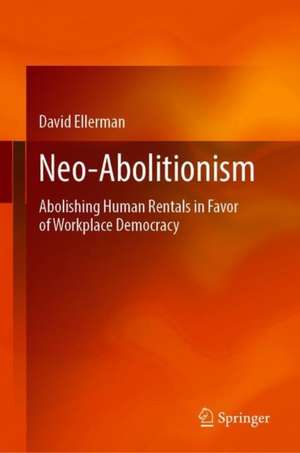Neo-Abolitionism: Abolishing Human Rentals in Favor of Workplace Democracy
Autor David Ellermanen Limba Engleză Hardback – 18 feb 2021
The author repositions the political and economic debate in the lineage of abolitionism - against the owning of other people - which in its modern version of neo-abolitionism would also abolish the renting, or hiring, employing, or leasing of other people.
The overall argument is based on three recovered theories, each one of which is sufficient to yield the neo-abolitionist conclusion. These three rights-based theories are developed throughout the book. The three theories are 1) inalienable rights theory, 2) the natural rights or labor theory of property, and 3) democratic theory as based on a democratic constitution that only delegates governance rights versus a non-democratic constitution that alienates governance rights.
The book, therefore, is a must-read for everybody interested in a better understanding of the political economy, workplace democracy, rights-based theories, and the employment system.
| Toate formatele și edițiile | Preț | Express |
|---|---|---|
| Paperback (1) | 634.18 lei 6-8 săpt. | |
| Springer International Publishing – 19 feb 2022 | 634.18 lei 6-8 săpt. | |
| Hardback (1) | 566.22 lei 3-5 săpt. | +18.72 lei 7-13 zile |
| Springer International Publishing – 18 feb 2021 | 566.22 lei 3-5 săpt. | +18.72 lei 7-13 zile |
Preț: 566.22 lei
Preț vechi: 707.78 lei
-20% Nou
Puncte Express: 849
Preț estimativ în valută:
108.35€ • 113.35$ • 90.00£
108.35€ • 113.35$ • 90.00£
Carte disponibilă
Livrare economică 12-26 martie
Livrare express 26 februarie-04 martie pentru 28.71 lei
Preluare comenzi: 021 569.72.76
Specificații
ISBN-13: 9783030626754
ISBN-10: 303062675X
Pagini: 230
Ilustrații: XII, 155 p. 14 illus.
Dimensiuni: 155 x 235 x 17 mm
Greutate: 0.41 kg
Ediția:1st ed. 2021
Editura: Springer International Publishing
Colecția Springer
Locul publicării:Cham, Switzerland
ISBN-10: 303062675X
Pagini: 230
Ilustrații: XII, 155 p. 14 illus.
Dimensiuni: 155 x 235 x 17 mm
Greutate: 0.41 kg
Ediția:1st ed. 2021
Editura: Springer International Publishing
Colecția Springer
Locul publicării:Cham, Switzerland
Cuprins
Introduction.- Contract: The Case Against the Human Rental Contract Based on Inalienability.- Property: The Case Against the Human Rental System Based on Private Property Rights.- Governance: The Case Against the Employment System Based on Democratic Theory.- Summary and Conclusions.
Notă biografică
David P. Ellerman is an Associate Researcher at the School of Social Science, University of Ljubljana, Slovenia, and a Gordon Fellow at the Institute for Advanced Study, Stellenbosch, South Africa. In 2003 he retired to academia after 10 years at the World Bank where he was the economic advisor and speech-writer for the Chief Economist Joseph Stiglitz. In his prior university teaching, Ellerman taught over a twenty-year period in the Boston area in five disciplines: economics, mathematics, computer science, operations research, and accounting. He was educated at Massachusetts Institute of Technology (USA), and at Boston University where he has two masters degrees, one in philosophy and one in economics, and a doctorate in mathematics. Ellerman has published many articles in scholarly journals, as well as several books in economics, logic, mathematics, physics, philosophy, and law.
Textul de pe ultima copertă
This book argues for the abolition of the employment system in favor of workplace democracy and thus escapes the usual capitalism-versus-socialism binary choice by reframing the basic issue as the employment contract, not private property or a market economy.
The author repositions the political and economic debate in the lineage of abolitionism - against the owning of other people - which in its modern version of neo-abolitionism would also abolish the renting, or hiring, employing, or leasing of other people.
The overall argument is based on three recovered theories, each one of which is sufficient to yield the neo-abolitionist conclusion. These three rights-based theories are developed throughout the book. The three theories are 1) inalienable rights theory, 2) the natural rights or labor theory of property, and 3) democratic theory as based on a democratic constitution that only delegates governance rights versus a non-democratic constitution that alienates governance rights.
The book, therefore, is a must-read for everybody interested in a better understanding of the political economy, workplace democracy, rights-based theories, and the employment system.
Caracteristici
Presents a modern version of neo-abolitionism which would also abolish the renting, hiring, employing, or leasing of other people Escapes the one and a half centuries old dichotomy of private employment versus public employment Explains through the intellectual history of three theories why the employer-employee relationship should be replaced by the system of workplace
